Hannah Tait just won FISU gold with Team Canada, and she’s not done climbing
From an early age, coaches knew the South Huron Minor Hockey product was headed for bigger things.
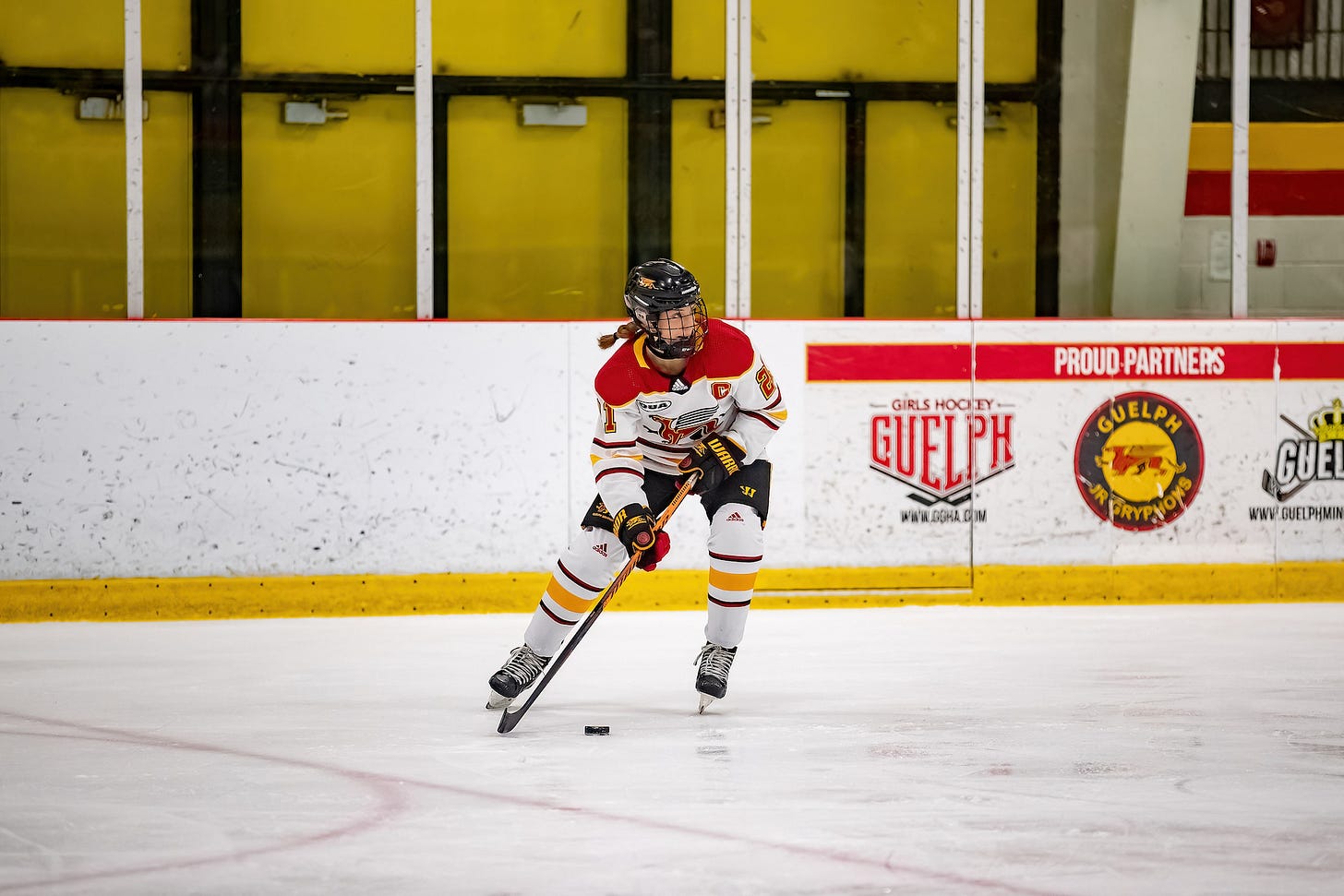
1.
Hannah Tait was no more than 10 years old at the time, chasing pucks and grinding through minor hockey drills with the South Huron Sabres at her home rink in Exeter.
But the coaches who guided her then will tell you she already had the glint of someone headed for bigger and better things.
In her brightest moments, those coaches would exchange knowing glances and make earnest prophecies disguised as offhanded jokes.
They spoke in the bemused way people in small towns often do in the presence of outliers. They said they’d be cheering for Tait somewhere else, someday — and they meant it.
“We knew she would go on to university sports,” said Krista McCann, who along with Kerri Fulton coached Tait in South Huron Atom and Peewee hockey.
“We knew she would potentially even go higher than that. She was self-driven. Competitive, for sure, but just such a highly respectful athlete — respectful of the people she was competing against. Definite leadership qualities, for sure, at such a young age.”
Tait was a natural athlete, with the kind of motor that eventually separates great young players from good ones. She played with her older sister Martina in the South Huron system and developed an amicable rivalry that sharpened them both.
“There was this respectful competition between the two of them,” said McCann, who still coaches hockey and works as executive director of the South Huron Hospital Foundation.
“Both of them are coaches' dreams. Certain players, you say, are incredibly coachable. That was both of them, and I think Hannah learned a lot of leadership skills from her sister.”
2.
As kids, Tait and Martina were known to spend hours on a backyard rink at their home in Exeter. Their brothers Adam and Charlie — Martina’s twin — played with them.
To their coaches, it seemed like they were constantly building skill.
In time, the four siblings — daughters and sons of Rob and Irene Tait, who still live in Exeter — would establish themselves as some of the best runners Huron County has produced.
They won medals of every colour at the WOSSAA cross country and track and field championships.
Hannah came close to bronze at OFSAA, when she was a student at St. Anne’s Catholic Secondary School in Clinton. She was the only one to stay with hockey into adulthood.
“I think I knew pretty quick that I was a competitive young girl,” said Tait, who is now captain of the University of Guelph women’s hockey team.
“Whatever I did, I wanted to give it 150 per cent. I loved the social aspect [of hockey], but I wanted to win.”
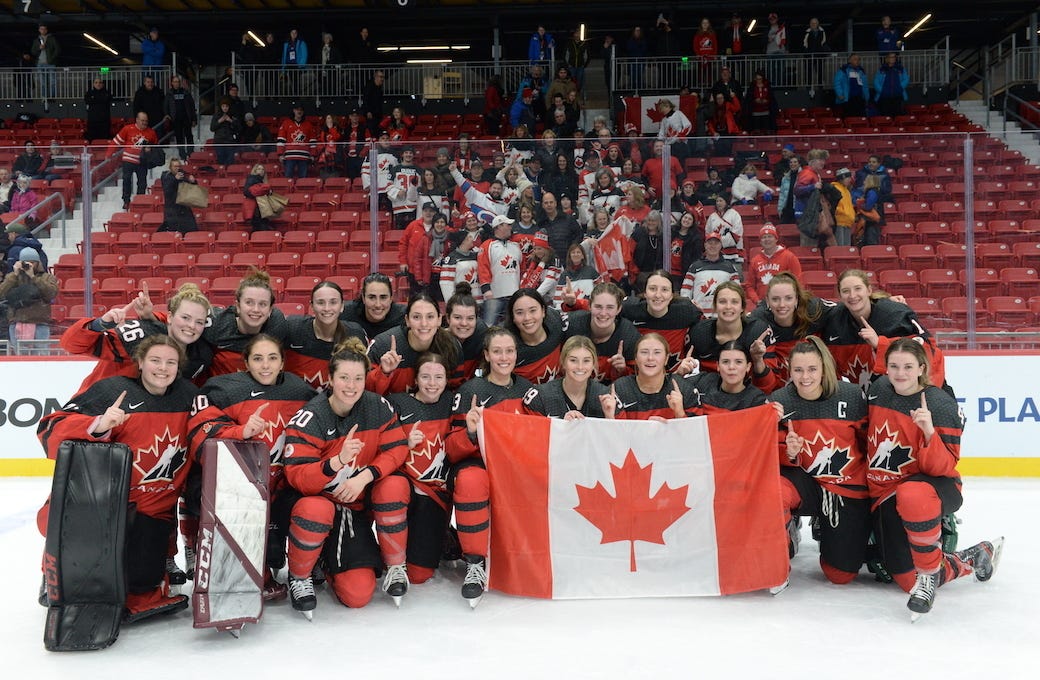
3.
Like many women of her generation, Tait started in ringette and played on boys hockey teams as well as girls teams.
At age 12 she joined the London Devilettes, an elite junior development program that has produced dozens of NCAA and Canadian university players.
“There were so many girls that would try out,” she said. “We'd get over 100 girls every year, and when I’d make that top ‘AA’ team, that would kind of just be like, ‘OK, you have a shot at this.’
“In Bantam, second year, schools from the States started reaching out. That’s when I was kind of like, ‘OK. You have the potential to really make this happen.’ ”
Clarkson, a powerhouse NCAA school, contacted Tait. So did Brown, Northeastern, Syracuse and the University of Connecticut.
Then, a health condition nearly derailed her career entirely. She doesn’t like to talk about it in detail, but at one point she nearly walked away from hockey for good.
“I kind of flew off the radar of a lot of schools, because I wasn’t really playing for a long time,” she noted. “When I got back into hockey … I kind of stuck more to the Canadian schools.”
4.
Guelph coach Rachel Flanagan had been watching Tait with the Devilettes and noticed a huge jump in her game between Grade 11 and Grade 12.
To Flanagan, it appeared Tait was a late bloomer. Her game hadn’t peaked yet, so there was room to grow.
And her academics were outstanding; Tait averaged better than 90 per cent as a student at St. Anne’s.
“We felt she was going to be a good fit for us from all aspects,” said Flanagan a former OUA All-Star player who coached the Gryphons to their first-ever national championship in 2019.
“We weren't exactly sure how much she would develop in our program, but we were hopeful. And obviously, she's proven that she can play at the highest level.”
As a freshman in 2019-20, Tait had six goals and 10 points in 24 regular-season games on a Guelph team that finished eighth and eked its way into the playoffs.
In the first round, they fell in a hard fought two-game series to the top-seeded University of Toronto. Both games ended in overtime; Guelph punched above its weight.
Tait took a step forward in her sophomore season, scoring four goals and grabbing four assists in just 13 games. The Gryphons made her an alternate captain, and she continued to grind away.
“Her shot really developed after her second year,” said Flanagan. “There was a lot of work that sort of needed to be done there, and she took a lot of initiative that summer to build on that.”
Tait had always been a fantastic skater, but her puck-handling and confidence also improved. She became more attuned to her own strengths and how to leverage them.
“We feel like we could move Hannah up and down our lineup if we need to,” said Flanagan. “She's got the skills to play on a line that's more of a checking line, and she's certainly one of our strongest penalty killers. I would say she's very difficult to play against on special teams.
“And then this year, she’s spent a bit more time on power play. She's not a power play specialist in the way that maybe you would think about it. But she's certainly — because of her speed and ability — she's learned a bit more about how to protect the puck.”
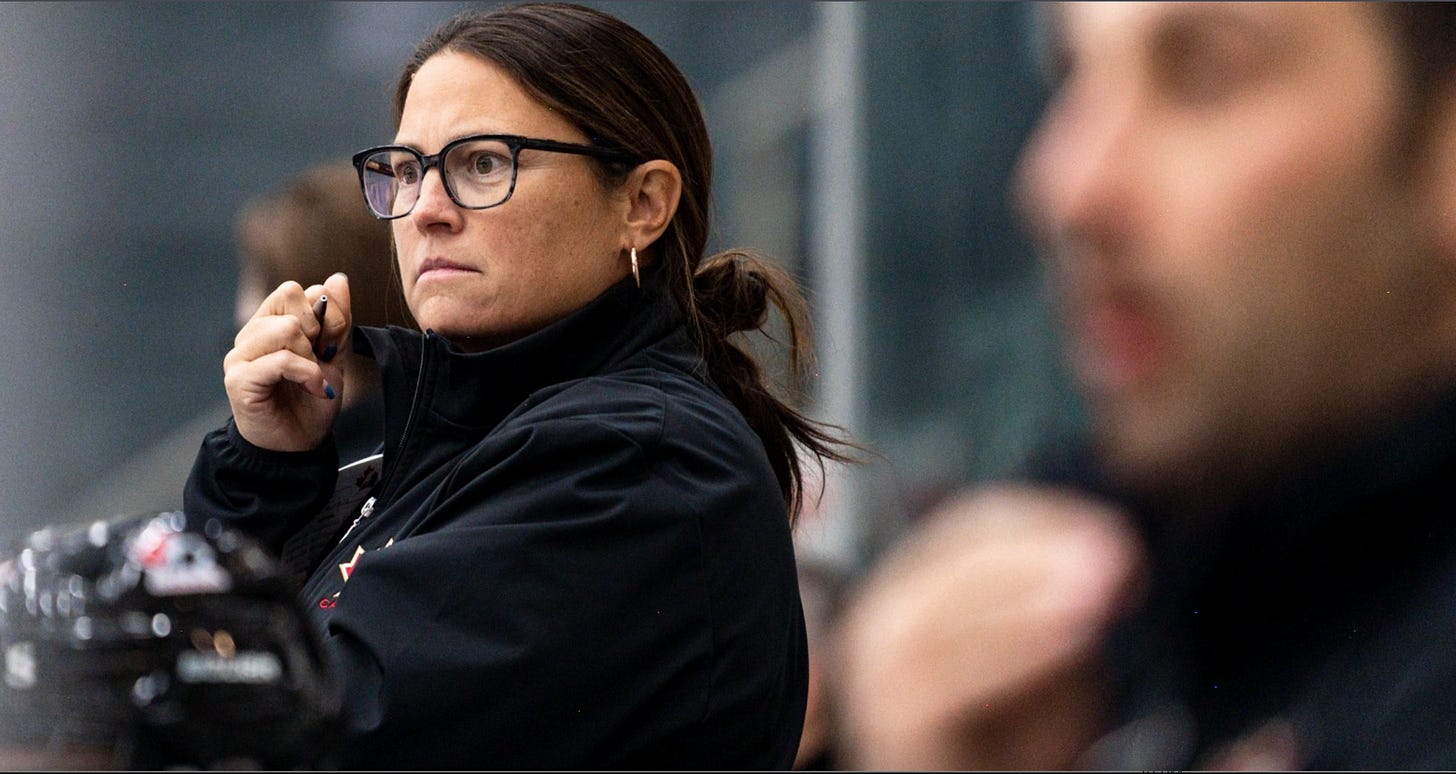
5.
On-ice vision is a product of both nature and nurture.
Tait’s ability to read plays and get tricky passes through traffic is partly innate, something she attributes to quick thinking and being naturally observant.
The rest was developed through good coaching and countless hours of watching and analyzing the game.
“Watching NHL or competitive female hockey at home and seeing what some of the best players do, it can give you inspiration on things to try,” she said.
“And also, chemistry with your linemates, I think, is huge — just knowing where they they're going to be, and that sort of thing.”
Her mission on every shift is to make the right play — feeding a teammate in the right spot, shooting the puck, backchecking like her life depends upon it — because she still wants to win.
And when the situation calls for it, Tait can juke around defenders to create her own scoring opportunities.
“Her confidence to play one-on-one hockey has really grown in the last couple of years,” said Flanagan.
“Before, she would have probably pulled up or waited for help. And now she feels that she's got the ability to take somebody one-on-one, and sometimes one-on-two … she's really sort of figured those things out.”
6.
Leadership ability is also partly learned, and partly innate.
It’s something Tait had in spades from an early age, but she continues to work at it — developing it, like any other skill.
“First and foremost, she's just a great human being, and she has the support of all of her teammates,” said Flanagan. “There's nobody on this team that wavered at all about whether or not she would be a good captain.”
“She goes out of her way to make sure people are OK,” Flanagan added. “And I think she doesn't take the leadership role lightly. I think it keeps her up at night, sometimes, to be honest.
“A good leader spends a lot of time reflecting on the decisions they make, and the way that they care for people. And she definitely has that — almost to a fault, sometimes.
“I think she cares so much that it sometimes affects her personally when she's trying to make a decision that's best for the team. And those are challenging decisions sometimes. I can't say enough about her, as a person.”
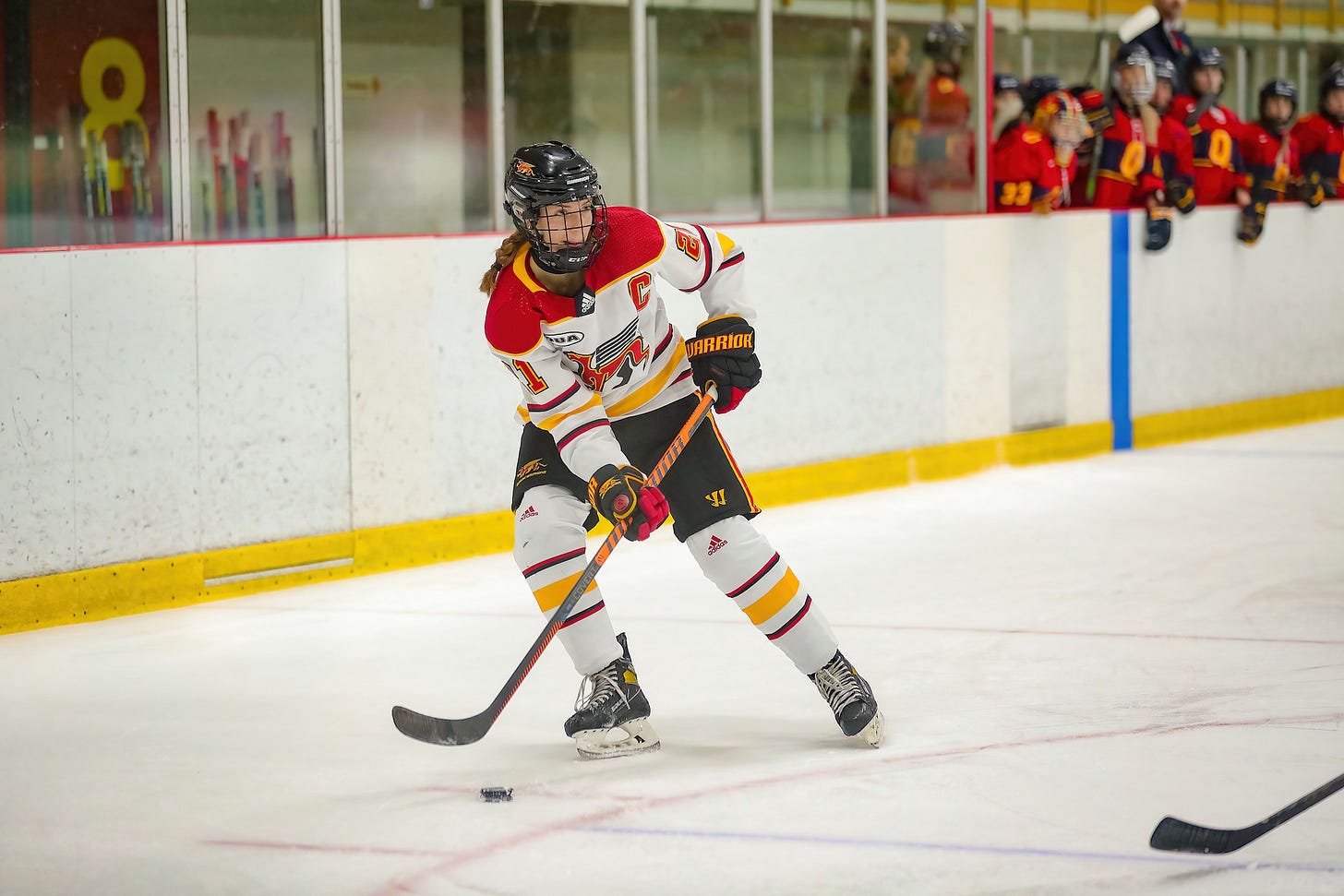
7.
Guelph is in the thick of the Ontario University Athletics (OUA) playoff hunt this season — second in the West division and five points back of the first-place Waterloo Warriors.
Tait was on a brief hiatus from the team while competing with Team Canada at the International University Sports Federation (FISU) World University Games last week in Lake Placid, N.Y.
They won gold, defeating Japan 5-0 in the final.
While she was away, Tait watched the Gryphons on livestreams as they continued to rack up wins.
“I think we’ve set the bar pretty high,” she said. “We had a good first half, but I don’t think that’s reflective of all the potential that we have as a team. We’ve had a lot of injuries and a lot of adversity, and we have a really great group of girls and a really great culture.
“I think that's something that really defines team success later on in the season … I think definitely, the goal is getting to Nationals — and doing well at Nationals.”
8.
It’s never too early to begin thinking about life after hockey, and Tait has been weighing her options.
As she finishes her fourth year of a five-year undergrad co-op program in management economics and finance, Tait has committed to return to the Gryphons next season.
After that, it’s unclear where life will guide her.
Growth in the women’s game means she’ll likely have opportunities to play professionally, either in North America or Europe. But she’s also considering a master’s degree that might allow her to return to competitive track and field.
“I'm not super-set on anything, but I'm also not ruling anything out,” she said.
“She could find herself playing a really good role on a professional team, if that's something she wants to do,” said her Guelph coach, Rachel Flanagan.
“Whatever she chooses to do when she when she graduates, she will be successful at — I'm sure of it. When she puts her mind to something, she generally succeeds, and always finishes the job she started.”
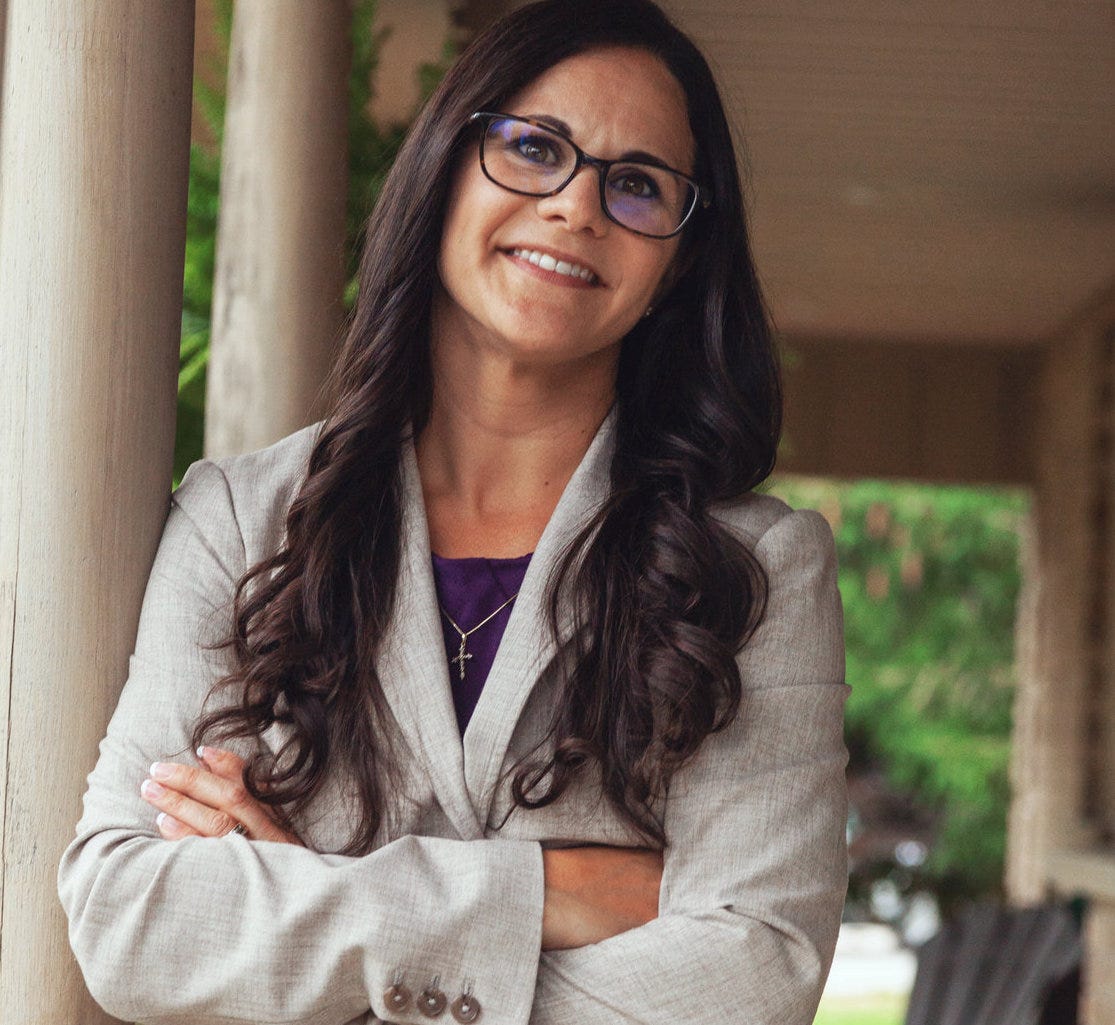
9.
By her own account, Krista McCann never played at a high level.
She started out in Stephen Minor Hockey, before its amalgamation into the South Huron system, and shifted to coaching with the Sabres at a young age.
Tait was a member of some of her earliest teams, and Tait saw McCann and fellow coach Kerri Fulton as early role models.
Devilettes coach Annette Darby was also an inspiration, and Tait chose to play for Guelph in part because of her respect for Flanagan and assistant coach Katie Mora.
“I think it's really important to try to be a role model for younger people in your community. I've tried to do that a little bit,” said Tait.
“And I think female coaching also goes along a long way in developing the women's game.”
Back in South Huron, it’s Tait who inspires her former coaches. Their knowing glances and earnest jokes have played out as expected.
“It's an inspiration, not only to younger girls in hockey, but also to the rest of us,” said McCann.
“I think it's so important that minor hockey associations like South Huron realize, this is the opportunity we're building for kids.
“For some people it's just a pastime — coming to the rink — but for many, it's way beyond just putting on skates and playing hockey. It's character development, it's human development, it's community development.
“And I know South Huron takes that very seriously. They work hard to give opportunity for players to grow at the highest level they possibly can.”


Congratulations Hannah!
I attended the same high school as Hannah's parents..both are great people! Athletes in there own right.